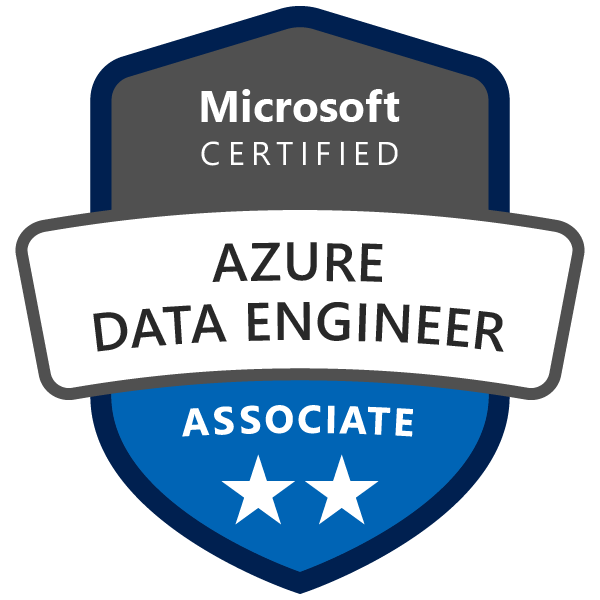Microsoft Azure Data Fundamentals
Course ID : DP-900T00-A
In this course, learners will learn the fundamentals of database concepts in a cloud environment, get basic skilling in cloud data services, and build their foundational knowledge of cloud data services within Microsoft Azure.
Learners will identify and describe core data concepts such as relational, non-relational, big data, and analytics, and explore how this technology is implemented with Microsoft Azure.
They will explore the roles, tasks, and responsibilities in the world of data. The learners will explore relational data offerings, provisioning and deploying relational databases, and querying relational data through cloud data solutions with Microsoft Azure.
They will explore non-relational data offerings, provisioning and deploying non-relational databases, and non-relational data stores with Microsoft Azure. Learners will explore the processing options available for building data analytics solutions in Azure.
They will explore Azure Synapse Analytics, Azure Databricks, and Azure HDInsight.
Learners will learn what Power BI is, including its building blocks and how they work together.

- 1 Day
- Beginner
- Tunisia / Bahrain
- English / French
- Virtual & Classroom Training
- Certification: N/A
- 1 Day
- Beginner
- Tunisia / Bahrain
- English / French
- Virtual & Classroom Training
- Certification: N/A
Module 1: Describe Core Data Concepts
- Describe Types of Core Data Workloads
- Describe Batch Data
- Describe Streaming Data
- Describe the Difference between Batch and Streaming Data
- Describe the Characteristics of Relational Data
- Describe Data Analytics Core Concepts
- Describe Data Visualization (e.g., Visualization, Reporting, Business Intelligence
- Describe Basic Chart Types such as Bar Charts and Pie Charts
- Describe Analytics Techniques (e.g., Descriptive, Diagnostic, Predictive, Prescriptive, Cognitive)
- Describe ELT and ETL Processing
- Describe the Concepts of Data Processing
Module 2: Describe How to Work with Relational Data on Azure
- Describe Relational Data Workloads
- Identify the right Data Offering for a Relational Workload
- Describe Relational Data Structures (e.g., tables, index, views)
- Describe Relational Azure Data Services
- Describe and compare PaaS, IaaS, and SaaS Delivery Models
- Describe Azure SQL Database
- Describe Azure Synapse Analytics
- Describe SQL Server on Azure Virtual Machine
- Describe Azure Database for PostgreSQL, Azure Database for MariaDB, and Azure
- Database for MySQL
- Describe Azure SQL Managed Instance
- Identify Basic Management Tasks for Relational Data
- Describe Provisioning and Deployment of Relational Data Services
- Describe Method for Deployment Including ARM Templates and Azure Portal
- Identify Data Security Components (e.g., Firewall, Authentication)
- Identify Basic Connectivity Issues (e.g., Accessing from On-premises, Access with Azure
- VNets, Access from Internet, Authentication, Firewalls)
- Identify Query Tools (e.g., Azure Data Studio, SQL Server Management Studio, sqlcmd Utility, etc.)
- Describe Query Techniques for Data using SQL Language
- Compare DDL Versus DML
- Query relational Data in PostgreSQL, MySQL, and Azure SQL Database
Module 3: Describe How to work with non-relational Data on Azure
- Describe Non-Relational Data Workloads
- Describe the Characteristics of Non-Relational Data
- Describe the Types of Non-Relational and NoSQL Data
- Recommend the Correct Data Store
- Determine When to use Non-Relational Data
- Describe non-relational Data Offerings on Azure
- Identify Azure Data Services for Non-Relational Workloads
- Describe Azure Cosmos DB APIs
- Describe Azure Table Storage
- Describe Azure Blob Storage
- Describe Azure File Storage
- Identify Basic Management Tasks for Non-Relational Data
- Describe Provisioning and Deployment of Non-Relational Data Services
- Describe Method for Deployment Including ARM Templates and Azure Portal
- Identify Data security components (e.g., Firewall, Authentication)
- Identify Basic Connectivity Issues (e.g., Accessing from On-Premises, Access with Azure VNets, Access from Internet, Authentication, Firewalls)
- Identify Management Tools for Non-Relational Data
Module 4: Describe an Analytics Workload on Azure
- Describe Analytics Workloads
- Describe Transactional Workloads
- Describe the Difference Between a Transactional and an Analytics Workload
- Describe the Difference between Batch and Real Time
- Describe Data Warehousing Workloads
- Determine when a Data Warehouse Solution is Needed
- Describe the components of a Modern Data Warehouse
- Describe Azure Data Services for Modern Data Warehousing such as Azure Data Lake, Azure Synapse Analytics, Azure Databricks, and Azure HDInsight
- Describe Modern Data Warehousing Architecture and Workload
- Describe Data Ingestion and Processing on Azure
- Describe Common Practices for Data Loading
- Describe the Components of Azure Data Factory (e.g., Pipeline, Activities, etc.)
- Describe Data Processing Options (e.g., HDI, Azure Databricks, Azure Synapse Analytics, Azure Data Factory)
- Describe Data Visualization in Microsoft Power BI
- Describe the Role of paginated Reporting
- Describe the Role of Interactive Reports
- Describe the Role of Dashboards
- Describe the Workflow in Power BI
Audience(s)
- Database Administrator
- Data Engineer
- Business Decision Makers
- IT Professionals
Objectives
- Describe core data concepts
- Describe how to work with relational data on Azure
- Describe how to work with non-relational data on Azure
- Describe an analytics workload on Azure
Related Course
Associated Badge
Data Engineering on Microsoft Azure
Course ID : DP-203T00-A


Ready for the training ? Fill the form
Make the most of your online learning experience
Our Online Learning Resource Center has tips, tricks and inspiring stories to help you learn while staying home.
THINK
Grow your expertise and advance your career